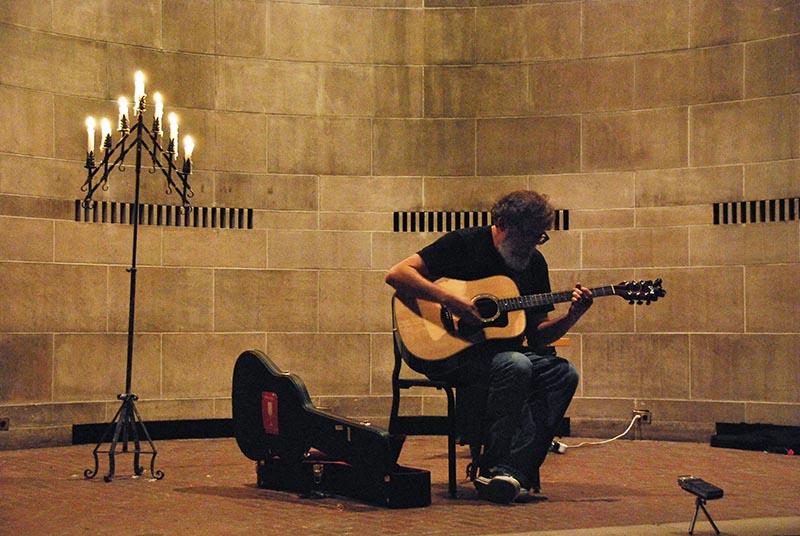Orcutt Peppers Compositions with Improvisation
Bill Orcutt fills Fairchild Chapel with resonant strumming. The prolific guitarist combined experimental techniques with more traditional, blues-based playing last Saturday.
April 17, 2015
Bill Orcutt has combined free improvisation, atonal harmonies and blues forms on the solo acoustic guitar for the past 10 years. Orcutt performed an improvised set in Fairchild Chapel last Saturday, where the San Francisco-based artist performed for nearly an hour but played only a handful
of songs. Both a guitarist and a composer, Orcutt imbues his songs with uncanny beauty and occasional discordance. Beginning his career with the band Harry Pussy, Orcutt is not new to performing or writing music. He began his solo career in 2009 and has since released four albums. Orcutt’s most recent record, Solo Acoustic Volume Ten, came out this past year. Its impulsive, abstract sounds peg Orcutt as part of a movement of avant-garde acoustic guitarists. His work grabs the listener’s attention and guides them through his pieces with quick plucks and fresh melodies.
Orcutt’s frenzied playing questions ideas about the guitar, tasking listeners to reimagine that the instrument has the potential to be utterly discordant. His music shifts between uninhibited tension and less disjunctive rhythms but still maintains a sense of free form throughout each piece. Taken as a whole, Orcutt’s music moves the listener into a sonic synthesis of improvised blues and disharmonious tunes, creating a unique vernacular for guitar playing. Anyone that knows Orcutt’s style would be able to recognize him immediately when listening to him play. This is a quality that many people argue is the mark of a great guitarist.
Orcutt’s strings broke during the beginning of his performance, as some of his pieces require a rather harsh plucking of the strings, but he didn’t appear fazed by this occurrence. Instead, he fixed his guitar in front of the audience and returned to his abstract performance in minutes.
Beautiful melodies occasionally emerged from the cacophony as Orcutt continued, and he sometimes jolted the audience by plucking the strings with an intensity that rushed the listeners back into discordance. The abrupt switches in his pieces revealed a hidden lyricism that told his audience that everything about his works is intentional, albeit experimentally written and performed. By the end of the performance, Orcutt had pulled the audience through a series of emotions and a musical reimagination. Nearly everyone in attendance stood to applaud his work.
Though experimental guitar has not garnered an enormous amount of media attention, the genre seems to be drawing a larger audience than ever before. Whether Orcutt becomes one of the more well-known musicians in this movement will reveal itself as his genre continues to progress and expand.


























